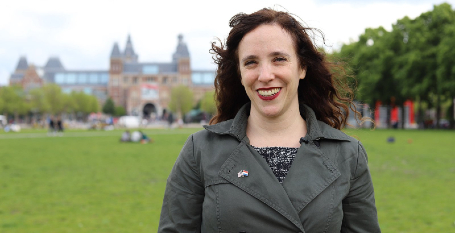Jessica Stern is the United States Special Envoy for the Promotion of the Human Rights of Lesbian, Gay, Bisexual, Transgender, Queer and Intersex People. She was appointed to that role by President Joe Biden.
Stern was recently visiting the Netherlands, where she was interviewed by Winq magazine.
What exactly is a Special Envoy?
Actually, I am an ambassador, but for a number of themes instead of a specific country. For example, for human rights.
In June 2021, I was appointed by President Biden. That means when I talk about certain topics, I do so as the direct representative of the president.
When it comes to LGBTQ topics in our relationship with other countries or with, for example, the United Nations, I not only represent the American government, but I also influence the subsidisation of the various LGBTQ organisations.
In addition, I provide an expert opinion to my colleagues from the Ministry of Foreign Affairs on LGBTQ issues. For example, how we can use our resources so that they are most effective for the community.
The presidential memorandum of February 4, 2021 is the basis of my activities. But if you read that text, this involves a lot of different things. I form coalitions between various collaborating parties, I draw attention to LGBTQ refugees and migrants. But, of course, I also react time and again to the violations of human rights, worldwide.
Above all, I have to ensure that I translate the vision from the text of the memorandum into workable goals.
You are an ambassador for the whole world!
The world is a bit big, isn't it? I have a team that supports me, but there is only one Jessica and the world is infinite. So, I have to keep my focus.
I am primarily an advocate for the LGBTQ community around the world. That is badly needed because this community experiences an awful lot of injustice, violence and discrimination - that is unacceptable.
Many of these people live in poverty and are simply forgotten. But they deserve more. They also deserve governments that will finally listen to them.
How do you handle that?
Every morning I start my day by reading messages sent to me in my role as Special Envoy on topics related to LGBTQ issues. What laws are being worked on in different countries and where, for example, have there been attacks on LGBTQ people? But also, are our embassies effectively engaging with local human rights initiatives?
Of course, you have to understand the context of each country well. That differs enormously - last week I was in Malaysia, Thailand and Vietnam. In Malaysia, you can go to jail for homosexuality and for what they call 'crossdressing' there. While in the other two countries they are working towards marriage equality.
In all cases, I maintain contact with the local LGBTQ organisations to hear from them what they're concerned about and what solutions they have in mind.
I've been working in LGBTQ activism for 25 years so I know a lot of people. Sometimes, I also use our embassies for this. We, as the United States, prefer to be in contact with all kinds of different people from a country - not just the activists who have been known for a long time, but also new groups that may still be operating somewhat under the radar.
After speaking with the people involved in the community, I will contact the government of that country. There are too few countries that have made LGBTQ rights an essential part of their foreign policy. They are often very interested because I get questions about best practices regarding, for example, gender dysphoria and decriminalisation. I can provide reliable advice and that also helps the local activists in their struggle.
I don't meet with governments that are openly hostile. I speak to countries that are going to take a step forward and countries that have just taken it. Positive attention there often leads to a better world for LGBTQ people.
Are things getting better or worse in the world for the LGBTQ community?
You may think it's a lame answer, but: both.
The LGBTQ theme is being discussed – in a negative way – in more and more countries. This domain is often misused for other political purposes. Political parties and powerful organisations keep harking back to that old adage: the LGBTQ community is being blamed for everything – a very easy, yet effective, way to win votes or sell newspapers. Media sensationalism.
New laws are being created which, for example, prohibit speaking about gender in schools. In addition, there is the erosion of democracy itself. In more and more countries, voting rights are suppressed and LGBTQ people are barred from political or public office in order to push through a conservative agenda. This puts democracy in that country under pressure.
We are the canary in the coal mine – LGBTQ people show you how a country is doing.
But there is also good news. I see new aid organisations emerging everywhere - that's important because to improve the world, you need a strong movement. These people are the single most important source of change for the LGBTQ world.
In Malaysia, I've met a lot of people who are under the age of 30. They are the new generation that will move the country forward.
In Botswana, homosexuality is no longer punishable - we've seen this coming for some time, but it's still a historic step forward. When the Supreme Court made this ruling, the head of state immediately welcomed LGBTQ activists at the highest level.
Original reporting by Edwin Reinerie for Winq magazine - reprinted with permission
Main image: U.S. Embassy The Hague, Samantha Macín Mengual

